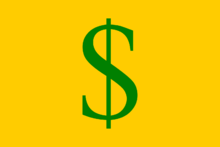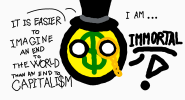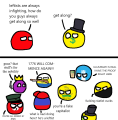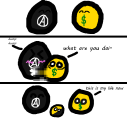imported>Polcompbot m (Formatting consistency changes) |
imported>Polcompbot m (Formatting consistency changes) |
||
| Line 180: | Line 180: | ||
Capitalism can fall under any cultural and civic positions, but as an economic system, it's usually regarded as right-wing (although some ideologies that can arguably be considered capitalist can also be considered economically centrist or center-left, such as [[File:Socdem.png]] [[Social Democracy]]). | Capitalism can fall under any cultural and civic positions, but as an economic system, it's usually regarded as right-wing (although some ideologies that can arguably be considered capitalist can also be considered economically centrist or center-left, such as [[File:Socdem.png]] [[Social Democracy]]). | ||
== History == | ==History== | ||
The expression "capitalist", which means a proprietor of capital, shows up sooner than the expression "private enterprise" and dates to the mid-seventeenth century. "Private enterprise" is determined from capital, which developed from capitale, a late Latin word based on caput, signifying "head"— which is likewise the cause of "property" and "cows" in the feeling of versatile property (just a lot later to allude just to livestock). Capital emerged in the thirteenth to fourteenth centuries to allude to reserves, load of product, total of cash or cash conveying interest. | The expression "capitalist", which means a proprietor of capital, shows up sooner than the expression "private enterprise" and dates to the mid-seventeenth century. "Private enterprise" is determined from capital, which developed from capitale, a late Latin word based on caput, signifying "head"— which is likewise the cause of "property" and "cows" in the feeling of versatile property (just a lot later to allude just to livestock). Capital emerged in the thirteenth to fourteenth centuries to allude to reserves, load of product, total of cash or cash conveying interest. | ||
| Line 187: | Line 187: | ||
According to the ''Oxford English Dictionary'' (OED), the term "capitalism" first appeared in English in 1854 in the novel, "The Newcomes" by William Makepeace Thackeray, where he meant "having ownership of capital". Also according to the OED, Carl Adolph Douai, a German American socialist and abolitionist, used the phrase "private capitalism" in 1863. | According to the ''Oxford English Dictionary'' (OED), the term "capitalism" first appeared in English in 1854 in the novel, "The Newcomes" by William Makepeace Thackeray, where he meant "having ownership of capital". Also according to the OED, Carl Adolph Douai, a German American socialist and abolitionist, used the phrase "private capitalism" in 1863. | ||
== Variants == | ==Variants== | ||
=== [[File:Lfree.png]] Laissez-Faire Capitalism/Unbridled Capitalism [[File:Austroliberalism-icon.png]] === | ===[[File:Lfree.png]] Laissez-Faire Capitalism/Unbridled Capitalism [[File:Austroliberalism-icon.png]]=== | ||
Laissez-faire capitalism is a form of capitalism where the government doesn't intervene in the economy whatsoever. A laissez-faire economy is one based on a free market, without any regulation on trade, business or working conditions. Laissez-faire capitalists also reject welfare, and believe in little (or even no) taxation. Laissez-faire capitalism can be justified either by arguing that such a system is the most efficient due to auto-regulation of the market, or that such a system is based on freedom, and therefore is the only ethical system. Laissez-faire capitalism is usually associated with libertarian ideologies such as [[File:Libertarian.png]] [[Libertarianism]], [[File:Minarchist.png]] [[Minarchism]], [[File:Austrobert.png]] [[Austrian School|Austrian Libertarianism]] and [[File:Ancapf.png]] [[Anarcho-Capitalism]], but it can also be supported by civically neutral, or even authoritarian ideologies. | Laissez-faire capitalism is a form of capitalism where the government doesn't intervene in the economy whatsoever. A laissez-faire economy is one based on a free market, without any regulation on trade, business or working conditions. Laissez-faire capitalists also reject welfare, and believe in little (or even no) taxation. Laissez-faire capitalism can be justified either by arguing that such a system is the most efficient due to auto-regulation of the market, or that such a system is based on freedom, and therefore is the only ethical system. Laissez-faire capitalism is usually associated with libertarian ideologies such as [[File:Libertarian.png]] [[Libertarianism]], [[File:Minarchist.png]] [[Minarchism]], [[File:Austrobert.png]] [[Austrian School|Austrian Libertarianism]] and [[File:Ancapf.png]] [[Anarcho-Capitalism]], but it can also be supported by civically neutral, or even authoritarian ideologies. | ||
=== [[File:RegCap.png]] Regulated Capitalism [[File:Keynes.png]] === | ===[[File:RegCap.png]] Regulated Capitalism [[File:Keynes.png]]=== | ||
Regulated capitalism is a system where the government intervenes in the economy in order to maximize efficiency, and/or to protect workers and consumers. All existing capitalist societies follow this form of capitalism, even the ones with most economic freedom. Economic regulations can range from worker protections (such as workplace safety laws, minimum wages, laws that protect unions, etc), to environmental regulations that penalize businesses that harm the environment, to government intervention to help the economy during times of crisis. Some of the most basic (in a modern economic sense) forms of regulation include: a central bank with varying degrees of independence (to control the supply of money to make it easy and cheap to borrow to stimulate growth, but also to manually intervene to reduce inflation) some kind of zoning/licensing laws, (although many people today want more relaxed laws), and protective or revenue-focused tariffs are other examples of generally liked regulations, where the government puts a tax on imported goods, either to try to keep jobs in the country, to raise revenue to fund expenditure, or to protect the local industry. Tariffs have been criticized in the past for being rather corrupt as national large businesses were infamous in the '''gilded age''' for bribing and lobbying politicians to raise tariffs on their goods to prevent foreign competitors from challenging them, tariffs have also been criticized for increasing the price of consumer goods to consumers and driving up poverty in the third world as it deprives businesses of cheap, plentiful labour which forces up costs and prices. in Some ideologies support minimal regulation to stimulate economic growth, such as [[File:Orlib.png]] [[Ordo-Liberalism]] and [[File:Neoliberal-icon.png]] [[Neoliberalism]], while some support quite a lot of regulation to protect the consumer, such as [[File:Socdem.png]] [[Social Democracy]]. The [[File:Keynes.png]] [[Keynesian School|Keynesian school of economics]] is a popular economic school that promotes regulated capitalism. | Regulated capitalism is a system where the government intervenes in the economy in order to maximize efficiency, and/or to protect workers and consumers. All existing capitalist societies follow this form of capitalism, even the ones with most economic freedom. Economic regulations can range from worker protections (such as workplace safety laws, minimum wages, laws that protect unions, etc), to environmental regulations that penalize businesses that harm the environment, to government intervention to help the economy during times of crisis. Some of the most basic (in a modern economic sense) forms of regulation include: a central bank with varying degrees of independence (to control the supply of money to make it easy and cheap to borrow to stimulate growth, but also to manually intervene to reduce inflation) some kind of zoning/licensing laws, (although many people today want more relaxed laws), and protective or revenue-focused tariffs are other examples of generally liked regulations, where the government puts a tax on imported goods, either to try to keep jobs in the country, to raise revenue to fund expenditure, or to protect the local industry. Tariffs have been criticized in the past for being rather corrupt as national large businesses were infamous in the '''gilded age''' for bribing and lobbying politicians to raise tariffs on their goods to prevent foreign competitors from challenging them, tariffs have also been criticized for increasing the price of consumer goods to consumers and driving up poverty in the third world as it deprives businesses of cheap, plentiful labour which forces up costs and prices. in Some ideologies support minimal regulation to stimulate economic growth, such as [[File:Orlib.png]] [[Ordo-Liberalism]] and [[File:Neoliberal-icon.png]] [[Neoliberalism]], while some support quite a lot of regulation to protect the consumer, such as [[File:Socdem.png]] [[Social Democracy]]. The [[File:Keynes.png]] [[Keynesian School|Keynesian school of economics]] is a popular economic school that promotes regulated capitalism. | ||
=== [[File:Soclib.png]] Welfare Capitalism [[File:Socdem.png]] === | ===[[File:Soclib.png]] Welfare Capitalism [[File:Socdem.png]]=== | ||
[[File:Soccap.png]] [[Social Capitalism|Welfare Capitalism]] is a form of Capitalism that promotes the existence of a welfare state, that is, the promotion of the creation of various government owned/ran enterprises that provide different services, such as public education, public healthcare, public housing, etc... This form of capitalism is also present in smaller or bigger proportions, on most modern societies. This system doesn't focus as much on regulation as a way to help the poorer citizens, but the providance of certain universally-needed services, so some modern societies that have large welfare systems, such as [[File:Cball-Denmark.png]] Denmark, dispose of certain regulations such as minimum wage or layoff payment. | [[File:Soccap.png]] [[Social Capitalism|Welfare Capitalism]] is a form of Capitalism that promotes the existence of a welfare state, that is, the promotion of the creation of various government owned/ran enterprises that provide different services, such as public education, public healthcare, public housing, etc... This form of capitalism is also present in smaller or bigger proportions, on most modern societies. This system doesn't focus as much on regulation as a way to help the poorer citizens, but the providance of certain universally-needed services, so some modern societies that have large welfare systems, such as [[File:Cball-Denmark.png]] Denmark, dispose of certain regulations such as minimum wage or layoff payment. | ||
=== [[File:Statecap.png]] State Capitalism [[File:Dirigisme.png]] === | ===[[File:Statecap.png]] State Capitalism [[File:Dirigisme.png]]=== | ||
[[File:Statecap.png]] [[State Capitalism]] is an economic system that focuses on the role of government on (for-profit) economic activity. It promotes the existence of various state-owned and state-ran enterprises, but in a different way than [[File:Soccap.png]] [[Social Capitalism|Welfare Capitalism]]. While Welfare Capitalism believes the state's role on the economy is to provide essential services, without much interference on the other sectors of the economy, State Capitalism believes the state should take a fundamental role on commercial activities, both owning a big portion of the economy and highly regulating the private portion of it; although, there is some overlapping between some societies that have in place a Welfarist Capitalist system and ones that have a State Capitalist system, such as [[File:Cball-Norway.png]] Norway, for example. It counts with two primary wings. One that wants an economy where public and private enterprises co-exist, while the other wants a society where private enterprise is banned and the state has a monopoly on production. | [[File:Statecap.png]] [[State Capitalism]] is an economic system that focuses on the role of government on (for-profit) economic activity. It promotes the existence of various state-owned and state-ran enterprises, but in a different way than [[File:Soccap.png]] [[Social Capitalism|Welfare Capitalism]]. While Welfare Capitalism believes the state's role on the economy is to provide essential services, without much interference on the other sectors of the economy, State Capitalism believes the state should take a fundamental role on commercial activities, both owning a big portion of the economy and highly regulating the private portion of it; although, there is some overlapping between some societies that have in place a Welfarist Capitalist system and ones that have a State Capitalist system, such as [[File:Cball-Norway.png]] Norway, for example. It counts with two primary wings. One that wants an economy where public and private enterprises co-exist, while the other wants a society where private enterprise is banned and the state has a monopoly on production. | ||
== Personality and Behaviour == | ==Personality and Behaviour== | ||
Capitalism is obsessed with money and is portrayed as wealthy and owning several businesses. He is extremely anti-taxation (unless that tax is used to help bail out his company), anti-public property, and pro-private ownership of capital. Capitalism is often portrayed with the personality and mannerisms of the character Mr. Krabs from ''Spongebob Squarepants''. | Capitalism is obsessed with money and is portrayed as wealthy and owning several businesses. He is extremely anti-taxation (unless that tax is used to help bail out his company), anti-public property, and pro-private ownership of capital. Capitalism is often portrayed with the personality and mannerisms of the character Mr. Krabs from ''Spongebob Squarepants''. | ||
== How to Draw == | ==How to Draw== | ||
{{Flag|Cap_flag.svg}} | {{Flag|Cap_flag.svg}} | ||
| Line 219: | Line 219: | ||
|c5 = Gold |h5 =#D1A803}} | |c5 = Gold |h5 =#D1A803}} | ||
== Relationships == | ==Relationships== | ||
=== Business Partners === | ===Business Partners=== | ||
*[[File:Austrobert.png]] [[Austrian School]] - Capitalist Austrian economies? Based and Great! He is like Chicago Libertarianism, but a little better! | *[[File:Austrobert.png]] [[Austrian School]] - Capitalist Austrian economies? Based and Great! He is like Chicago Libertarianism, but a little better! | ||
*[[File:Chilib.png]] [[Chicago School]] - Yeah, more libertarian economies! | *[[File:Chilib.png]] [[Chicago School]] - Yeah, more libertarian economies! | ||
| Line 253: | Line 253: | ||
*[[File:3way.png]] [[Third Way]] - Like Social Democracy but without its issues. Still a bit too regulationist but we can look past that. | *[[File:3way.png]] [[Third Way]] - Like Social Democracy but without its issues. Still a bit too regulationist but we can look past that. | ||
=== Mixed === | ===Mixed=== | ||
*[[File:Klep.png]] [[Kleptocracy]] - I can't believe someone greedier than me exists but hey, beggars can't be choosers. | *[[File:Klep.png]] [[Kleptocracy]] - I can't believe someone greedier than me exists but hey, beggars can't be choosers. | ||
| Line 357: | Line 357: | ||
===Gallery=== | ===Gallery=== | ||
==== Comics ==== | ====Comics==== | ||
<gallery widths="185" orientation="square" mode="slideshow"> | <gallery widths="185" orientation="square" mode="slideshow"> | ||
ThePosadist-eStrikes.png|[https://old.reddit.com/r/Polcompball/comments/h9zsup/robot_uprising_at_ancap_inc/ Robot Uprising at ANCAP Inc.] by ThePosadist | ThePosadist-eStrikes.png|[https://old.reddit.com/r/Polcompball/comments/h9zsup/robot_uprising_at_ancap_inc/ Robot Uprising at ANCAP Inc.] by ThePosadist | ||
| Line 374: | Line 374: | ||
</gallery> | </gallery> | ||
==== Portraits and Artwork ==== | ====Portraits and Artwork==== | ||
<gallery> | <gallery> | ||
634757885879.png | 634757885879.png | ||
| Line 383: | Line 383: | ||
</gallery> | </gallery> | ||
===== Alternative designs ===== | =====Alternative designs===== | ||
<gallery> | <gallery> | ||
Pcb Markets.png|Markets, from [[File:8ValuesBall.png]] [[Values#8Values|8Values]] | Pcb Markets.png|Markets, from [[File:8ValuesBall.png]] [[Values#8Values|8Values]] | ||
Revision as of 00:09, 9 June 2023
Capitalism is an economic system representing a broad range of ideologies that fall under the umbrella of "capitalism". Capitalism is defined in many different ways, by ![]() Socialists it's usually defined as a system where the bourgeoisie exploit the proletariat, by
Socialists it's usually defined as a system where the bourgeoisie exploit the proletariat, by ![]() Market Anarchists it's usually defined as
Market Anarchists it's usually defined as ![]() corrupt markets and by
corrupt markets and by ![]() Right-Libertarians it's usually defined as a free enterprise system.
Capitalism fundamentally needs 5 institutions to function:
Right-Libertarians it's usually defined as a free enterprise system.
Capitalism fundamentally needs 5 institutions to function:
Other ingredients necessary for the development of Capitalism are:
 Contractual freedom.
Contractual freedom. Constitutional (limited) government.
Constitutional (limited) government. Free financial markets and access to capital.
Free financial markets and access to capital. Ease of starting and managing a business.
Ease of starting and managing a business. A good and efficient law system.
A good and efficient law system.
The meaning of capital is also often misunderstood, since it's not only money but everything necessary for the production of consumer goods: Workers, capacitation of the workers, machines, raw materials, the workplace itself, financial capital (The money that finances those capital goods), etc...
Capitalism can fall under any cultural and civic positions, but as an economic system, it's usually regarded as right-wing (although some ideologies that can arguably be considered capitalist can also be considered economically centrist or center-left, such as ![]() Social Democracy).
Social Democracy).
History
The expression "capitalist", which means a proprietor of capital, shows up sooner than the expression "private enterprise" and dates to the mid-seventeenth century. "Private enterprise" is determined from capital, which developed from capitale, a late Latin word based on caput, signifying "head"— which is likewise the cause of "property" and "cows" in the feeling of versatile property (just a lot later to allude just to livestock). Capital emerged in the thirteenth to fourteenth centuries to allude to reserves, load of product, total of cash or cash conveying interest.
By 1283, it was utilized in the feeling of the capital resources of an exchanging firm and was regularly traded with different words—riches, cash, reserves, merchandise, resources, property, etc...
According to the Oxford English Dictionary (OED), the term "capitalism" first appeared in English in 1854 in the novel, "The Newcomes" by William Makepeace Thackeray, where he meant "having ownership of capital". Also according to the OED, Carl Adolph Douai, a German American socialist and abolitionist, used the phrase "private capitalism" in 1863.
Variants
 Laissez-Faire Capitalism/Unbridled Capitalism
Laissez-Faire Capitalism/Unbridled Capitalism 
Laissez-faire capitalism is a form of capitalism where the government doesn't intervene in the economy whatsoever. A laissez-faire economy is one based on a free market, without any regulation on trade, business or working conditions. Laissez-faire capitalists also reject welfare, and believe in little (or even no) taxation. Laissez-faire capitalism can be justified either by arguing that such a system is the most efficient due to auto-regulation of the market, or that such a system is based on freedom, and therefore is the only ethical system. Laissez-faire capitalism is usually associated with libertarian ideologies such as ![]() Libertarianism,
Libertarianism, ![]() Minarchism,
Minarchism, ![]() Austrian Libertarianism and
Austrian Libertarianism and ![]() Anarcho-Capitalism, but it can also be supported by civically neutral, or even authoritarian ideologies.
Anarcho-Capitalism, but it can also be supported by civically neutral, or even authoritarian ideologies.
 Regulated Capitalism
Regulated Capitalism 
Regulated capitalism is a system where the government intervenes in the economy in order to maximize efficiency, and/or to protect workers and consumers. All existing capitalist societies follow this form of capitalism, even the ones with most economic freedom. Economic regulations can range from worker protections (such as workplace safety laws, minimum wages, laws that protect unions, etc), to environmental regulations that penalize businesses that harm the environment, to government intervention to help the economy during times of crisis. Some of the most basic (in a modern economic sense) forms of regulation include: a central bank with varying degrees of independence (to control the supply of money to make it easy and cheap to borrow to stimulate growth, but also to manually intervene to reduce inflation) some kind of zoning/licensing laws, (although many people today want more relaxed laws), and protective or revenue-focused tariffs are other examples of generally liked regulations, where the government puts a tax on imported goods, either to try to keep jobs in the country, to raise revenue to fund expenditure, or to protect the local industry. Tariffs have been criticized in the past for being rather corrupt as national large businesses were infamous in the gilded age for bribing and lobbying politicians to raise tariffs on their goods to prevent foreign competitors from challenging them, tariffs have also been criticized for increasing the price of consumer goods to consumers and driving up poverty in the third world as it deprives businesses of cheap, plentiful labour which forces up costs and prices. in Some ideologies support minimal regulation to stimulate economic growth, such as ![]() Ordo-Liberalism and
Ordo-Liberalism and ![]() Neoliberalism, while some support quite a lot of regulation to protect the consumer, such as
Neoliberalism, while some support quite a lot of regulation to protect the consumer, such as ![]() Social Democracy. The
Social Democracy. The ![]() Keynesian school of economics is a popular economic school that promotes regulated capitalism.
Keynesian school of economics is a popular economic school that promotes regulated capitalism.
 Welfare Capitalism
Welfare Capitalism 
![]() Welfare Capitalism is a form of Capitalism that promotes the existence of a welfare state, that is, the promotion of the creation of various government owned/ran enterprises that provide different services, such as public education, public healthcare, public housing, etc... This form of capitalism is also present in smaller or bigger proportions, on most modern societies. This system doesn't focus as much on regulation as a way to help the poorer citizens, but the providance of certain universally-needed services, so some modern societies that have large welfare systems, such as
Welfare Capitalism is a form of Capitalism that promotes the existence of a welfare state, that is, the promotion of the creation of various government owned/ran enterprises that provide different services, such as public education, public healthcare, public housing, etc... This form of capitalism is also present in smaller or bigger proportions, on most modern societies. This system doesn't focus as much on regulation as a way to help the poorer citizens, but the providance of certain universally-needed services, so some modern societies that have large welfare systems, such as ![]() Denmark, dispose of certain regulations such as minimum wage or layoff payment.
Denmark, dispose of certain regulations such as minimum wage or layoff payment.
 State Capitalism
State Capitalism 
![]() State Capitalism is an economic system that focuses on the role of government on (for-profit) economic activity. It promotes the existence of various state-owned and state-ran enterprises, but in a different way than
State Capitalism is an economic system that focuses on the role of government on (for-profit) economic activity. It promotes the existence of various state-owned and state-ran enterprises, but in a different way than ![]() Welfare Capitalism. While Welfare Capitalism believes the state's role on the economy is to provide essential services, without much interference on the other sectors of the economy, State Capitalism believes the state should take a fundamental role on commercial activities, both owning a big portion of the economy and highly regulating the private portion of it; although, there is some overlapping between some societies that have in place a Welfarist Capitalist system and ones that have a State Capitalist system, such as
Welfare Capitalism. While Welfare Capitalism believes the state's role on the economy is to provide essential services, without much interference on the other sectors of the economy, State Capitalism believes the state should take a fundamental role on commercial activities, both owning a big portion of the economy and highly regulating the private portion of it; although, there is some overlapping between some societies that have in place a Welfarist Capitalist system and ones that have a State Capitalist system, such as ![]() Norway, for example. It counts with two primary wings. One that wants an economy where public and private enterprises co-exist, while the other wants a society where private enterprise is banned and the state has a monopoly on production.
Norway, for example. It counts with two primary wings. One that wants an economy where public and private enterprises co-exist, while the other wants a society where private enterprise is banned and the state has a monopoly on production.
Personality and Behaviour
Capitalism is obsessed with money and is portrayed as wealthy and owning several businesses. He is extremely anti-taxation (unless that tax is used to help bail out his company), anti-public property, and pro-private ownership of capital. Capitalism is often portrayed with the personality and mannerisms of the character Mr. Krabs from Spongebob Squarepants.
How to Draw

- Draw a ball,
- Color the ball yellow,
- Add an acid green dollar sign in it's middle,
- Draw in the two eyes,
- Give the ball a black top hat with a red stripe, and a golden monocle,
You're done.
| Color Name | HEX | RGB | |
|---|---|---|---|
| Yellow | #FFFF00 | 255, 255, 0 | |
| Acid Green | #0AD70A | 10, 215, 10 | |
| Black | #141414 | 20, 20, 20 | |
| Red | #E10600 | 225, 6, 0 | |
| Gold | #D1A803 | 209, 168, 3 | |
Relationships
Business Partners
 Austrian School - Capitalist Austrian economies? Based and Great! He is like Chicago Libertarianism, but a little better!
Austrian School - Capitalist Austrian economies? Based and Great! He is like Chicago Libertarianism, but a little better! Chicago School - Yeah, more libertarian economies!
Chicago School - Yeah, more libertarian economies! Neoliberalism - Most successful form of me and controller of the Overton Window.
Neoliberalism - Most successful form of me and controller of the Overton Window. Libertarianism - Helps me on the weed plantations.
Libertarianism - Helps me on the weed plantations. Authoritarian Capitalism - My authoritarian child.
Authoritarian Capitalism - My authoritarian child. Pink Capitalism - We gotta meet the woke customer demand.
Pink Capitalism - We gotta meet the woke customer demand. Paleolibertarianism - Conservative but more like me.
Paleolibertarianism - Conservative but more like me. National Libertarianism - Same as above, but more Nationalist.
National Libertarianism - Same as above, but more Nationalist. Libertarian Conservatism
Libertarian Conservatism  - He like guns as well, and same reasons above the 2, but he is conservative like
- He like guns as well, and same reasons above the 2, but he is conservative like  Paleolibertarianism
Paleolibertarianism Hoppeanism - Helps me with racist customers.
Hoppeanism - Helps me with racist customers. Eco-Capitalism - Nuclear Power is cheaper than Fossil fuels!
Eco-Capitalism - Nuclear Power is cheaper than Fossil fuels! Totally not because I want Energy Subsidies though... Anarcho-Capitalism - He thinks he is real capitalism, but I can work anywhere.
Anarcho-Capitalism - He thinks he is real capitalism, but I can work anywhere. Classical Liberalism - My other parent who shares my love for free trade. I remember when you cradled me in your arms.
Classical Liberalism - My other parent who shares my love for free trade. I remember when you cradled me in your arms. Conservatism - You worked with me for so long... Ok, I will give you a discount.
Conservatism - You worked with me for so long... Ok, I will give you a discount. Sorry if I have to cancel stuff to protect my profits. Enlightenment Thought - You made me possible.
Enlightenment Thought - You made me possible. Fiscal Conservatism - My favorite customer, always paying in time.
Fiscal Conservatism - My favorite customer, always paying in time. Civic Nationalism - Increases my client base ensuring higher profit margins.
Civic Nationalism - Increases my client base ensuring higher profit margins. Monarcho-Capitalism - He has an eye for luxury.
Monarcho-Capitalism - He has an eye for luxury. Pinochetism - Main helicopters importer and crusher of commie dreams.
Pinochetism - Main helicopters importer and crusher of commie dreams. Neoconservatism &
Neoconservatism &  Neo-Libertarianism - Make war, buy guns. Also keep up by stopping commies from rising to power!
Neo-Libertarianism - Make war, buy guns. Also keep up by stopping commies from rising to power! Objectivism - Oh baby, nobody else loves me like you!
Objectivism - Oh baby, nobody else loves me like you! Meritocracy - I aspire to be like you.
Meritocracy - I aspire to be like you. Plutocracy - "The direct goal of capitalism is plutocracy." -
Plutocracy - "The direct goal of capitalism is plutocracy." -  Vladimir Lenin from another universe.
Vladimir Lenin from another universe. Calvinist Theocracy - The best religion!
Calvinist Theocracy - The best religion! Yellow Unionism - The only trade unions that I like.
Yellow Unionism - The only trade unions that I like. Liberal Feminism - Yay! More Female CEOs!
Liberal Feminism - Yay! More Female CEOs! Libertarian Feminism - You are my favorite daughter.
Libertarian Feminism - You are my favorite daughter. Capitalist Transhumanism - Praise be to our R&D department!
Capitalist Transhumanism - Praise be to our R&D department! Ilminism - Capitalism is why South Korea is more prosperous than the North!
Ilminism - Capitalism is why South Korea is more prosperous than the North! Thatcherism - Best British politician.
Thatcherism - Best British politician. Third Way - Like Social Democracy but without its issues. Still a bit too regulationist but we can look past that.
Third Way - Like Social Democracy but without its issues. Still a bit too regulationist but we can look past that.
Mixed
 Kleptocracy - I can't believe someone greedier than me exists but hey, beggars can't be choosers.
Kleptocracy - I can't believe someone greedier than me exists but hey, beggars can't be choosers. Corporatism - I don't like him, but you know, money is money... Also could you like not to say that the banks are controlled by the Jews or something.
Corporatism - I don't like him, but you know, money is money... Also could you like not to say that the banks are controlled by the Jews or something. Agorism - Helps me to infiltrate red countries. Doesn't like me for some reason.
Agorism - Helps me to infiltrate red countries. Doesn't like me for some reason. Monarchism - I don't like him either with this Monarchy thing, but he is rich.
Monarchism - I don't like him either with this Monarchy thing, but he is rich. Mercantilism - You're my predecessor, but I wish you were more pro-free trade, though.
Mercantilism - You're my predecessor, but I wish you were more pro-free trade, though. Capitalist Communism - Look son, 50% of the time you're right. The other 50% of the time you’re wrong.
Capitalist Communism - Look son, 50% of the time you're right. The other 50% of the time you’re wrong. Athenian Democracy - Why does one of the only non-capitalists who realizes that I don't support slavery have to mean that in a negative way!? Also slavery is wrong both morally and economically.
Athenian Democracy - Why does one of the only non-capitalists who realizes that I don't support slavery have to mean that in a negative way!? Also slavery is wrong both morally and economically. Ignore the fact that I support sweatshops and wage slavery. National Capitalism - Good economics, but racism and statism are bad for business.
National Capitalism - Good economics, but racism and statism are bad for business. Regulationism - My little friend who thinks markets need regulations... what?
Regulationism - My little friend who thinks markets need regulations... what? State Capitalism - I always feel bad having deals with him, but pecunia non olet.
State Capitalism - I always feel bad having deals with him, but pecunia non olet. Dengism -
Dengism -  State Capitalism in practice but in red.
State Capitalism in practice but in red. Social Capitalism - Another son of mine but... why do you support this welfare shit thing? Oh lord. Please remove the "social" part of your name, but good job in
Social Capitalism - Another son of mine but... why do you support this welfare shit thing? Oh lord. Please remove the "social" part of your name, but good job in  Germany.
Germany. Paternalistic Conservatism - He is somewhat capitalistic but he supports this "social welfare" shit. Sorry bro, companies have the freedom to do as they please without taxes being thrusted against their throats to pay for the services of others.
Paternalistic Conservatism - He is somewhat capitalistic but he supports this "social welfare" shit. Sorry bro, companies have the freedom to do as they please without taxes being thrusted against their throats to pay for the services of others. Social Democracy - He is somewhat capitalistic but he supports this "labor rights" shit. Then again, he might've saved my life in the Interwar period. I also liked how you crushed those commies in Germany.
Social Democracy - He is somewhat capitalistic but he supports this "labor rights" shit. Then again, he might've saved my life in the Interwar period. I also liked how you crushed those commies in Germany. Fascism - Thinks I'm a degenerate or whatever, but did a damn good job at crushing those commies (even though he was created by a former commie, so it's best to be wary). But he nationalized many industries and was second behind the USSR, which is why I am skeptical about him.
Fascism - Thinks I'm a degenerate or whatever, but did a damn good job at crushing those commies (even though he was created by a former commie, so it's best to be wary). But he nationalized many industries and was second behind the USSR, which is why I am skeptical about him. Nazism - Again, goes off about how I'm a degenerate or whatever, but certainly not a bad business partner by any means... One big negative factor in my own opinion of you is that your defeat in World War 2 made Eastern Europe a communist heartland for several decades.
Nazism - Again, goes off about how I'm a degenerate or whatever, but certainly not a bad business partner by any means... One big negative factor in my own opinion of you is that your defeat in World War 2 made Eastern Europe a communist heartland for several decades. Technocracy - If you really detest me that much, why haven't I seen you reject my investment? Oh right, you need that, maybe you should remember that too.
Technocracy - If you really detest me that much, why haven't I seen you reject my investment? Oh right, you need that, maybe you should remember that too. Guevarism - He wants to kill me, but I do get rich off of selling his face on posters and t-shirts...
Guevarism - He wants to kill me, but I do get rich off of selling his face on posters and t-shirts... Landian Accelerationism - Capital uses people to create metal body for itself? That's something only a Marxist would compose... You also support me?!
Landian Accelerationism - Capital uses people to create metal body for itself? That's something only a Marxist would compose... You also support me?! Corporatocracy - Congratulations on taking over the world but why lobbying and monopoly?
Corporatocracy - Congratulations on taking over the world but why lobbying and monopoly? Avaritionism - Look, I can meet your demand for money and killing, just hop in any PMC or sign an army contract, but you absolutely cannot rob or kill people here, I can't work without civil rights.
Avaritionism - Look, I can meet your demand for money and killing, just hop in any PMC or sign an army contract, but you absolutely cannot rob or kill people here, I can't work without civil rights.
Competitors
 Socialism - All you are is a lazy moron. Why don't you want to work?! Back in the factory, now!
Socialism - All you are is a lazy moron. Why don't you want to work?! Back in the factory, now! I knew I shouldn't have gone over to his New Year's Party, otherwise we wouldn't have had him.
him. Anarcho-Communism - Yeah, nice try.
Anarcho-Communism - Yeah, nice try. Syndicalism &
Syndicalism &  Anarcho-Syndicalism - STOP IT WITH THE DAMNED UNIONS!
Anarcho-Syndicalism - STOP IT WITH THE DAMNED UNIONS! Marxism–Leninism - You're nothing but a failure. Yet for some reason you're popular with college kids.
Marxism–Leninism - You're nothing but a failure. Yet for some reason you're popular with college kids. National Bolshevism - Racist commie.
National Bolshevism - Racist commie. Feudalism - The only right-winger I completely hate. You had your day, now it's our turn.
Feudalism - The only right-winger I completely hate. You had your day, now it's our turn. Reactionary Socialism - Quit rebranding yourselves as a filthy red!
Reactionary Socialism - Quit rebranding yourselves as a filthy red! Anti-Fascism - There is nothing inherently bad in being based on human greed.
Anti-Fascism - There is nothing inherently bad in being based on human greed. National Syndicalism - You're just corporatism but farther left.
National Syndicalism - You're just corporatism but farther left. Anarcho-Primitivism - He wants to destroy me in favor of a hunter-gatherer society... what the fuck?
Anarcho-Primitivism - He wants to destroy me in favor of a hunter-gatherer society... what the fuck? Leninism - I sold him a rope and now he's trying to hang me with it...
Leninism - I sold him a rope and now he's trying to hang me with it... Post-Leftism - What do you mean you're against work? How else will me and my workers make me money?
Post-Leftism - What do you mean you're against work? How else will me and my workers make me money? Gamefication of work is based tho. Anarcho-Egoism - He doesn't respect property rights... At least he's not a commie.
Anarcho-Egoism - He doesn't respect property rights... At least he's not a commie. Ego-Communism - Oh come on!
Ego-Communism - Oh come on! Posadism - Psycho who wants to nuke me out of existence.
Posadism - Psycho who wants to nuke me out of existence. Bio-Posadism - We will not shut down the economy because of you!
Bio-Posadism - We will not shut down the economy because of you! African Socialism - Commie who doesn't understand that capitalism is good for Africa.
African Socialism - Commie who doesn't understand that capitalism is good for Africa. Strasserism - I was willing to work with
Strasserism - I was willing to work with  him, but this is too much.
him, but this is too much. Marxism - You're just a lazy college student who's never lived in a real communist country. Also, what is dialectical materialism other than a religion made into a political ideology?
Marxism - You're just a lazy college student who's never lived in a real communist country. Also, what is dialectical materialism other than a religion made into a political ideology? Marxist Feminism - I prefer
Marxist Feminism - I prefer  Liberal Feminism over you.
Liberal Feminism over you. Anarcha-Feminism - Same as above but anarchist.
Anarcha-Feminism - Same as above but anarchist. Utopian Socialism - You're better than the tankies, but that's not saying much.
Utopian Socialism - You're better than the tankies, but that's not saying much. Austromarxism - Stupid Austrian commie! I like and prefer
Austromarxism - Stupid Austrian commie! I like and prefer  Austrian School not you!
Austrian School not you! Pol Potism - Hands off my monocle, stupid commie maniac!
Pol Potism - Hands off my monocle, stupid commie maniac! Illegalism - Stop trying to rob me and squatting my property you Moron!
Illegalism - Stop trying to rob me and squatting my property you Moron! But you can rob these unions though.
unions though. Soulism - You can have everything you want in your lucid dreams? Well, good luck with hunger and thirst then - because you still a material being made of flesh, which means that your dreams only satisfy your consciousness, but not your material body.
Soulism - You can have everything you want in your lucid dreams? Well, good luck with hunger and thirst then - because you still a material being made of flesh, which means that your dreams only satisfy your consciousness, but not your material body.
Further Information
Wikipedia
- Capitalism
- Laissez-Faire
- Privitization
- Capitalist Mode of Production
- Division of Labour
- Free Trade
- Free Market
- Economic Liberalism
- Entrepreneurship
- State Capitalism
- Welfare Capitalism
- Private Property
- Wage Labour
- Profit Motive
- Voluntary Exchange
- Bourgeoisie
- Adam Smith
Literature
- The Wealth of Nations by
 Adam Smith
Adam Smith - Capitalism and Freedom by
 Milton Friedman
Milton Friedman - Bright Promises, Dismal Performance: An Economist's Protest by
 Milton Friedman
Milton Friedman - Milton Friedman: A Biography by
 Lanny Ebenstein
Lanny Ebenstein - The Mystery of Capital: Why Capitalism Triumphs in the West and Fails Everywhere Else by
 Hernando de Soto
Hernando de Soto  Basic Economics by
Basic Economics by  Thomas Sowell
Thomas Sowell- End The Fed by
 Ron Paul
Ron Paul - Pillars of Prosperity: Free Markets, Honest Money, Private Property by
 Ron Paul
Ron Paul - Meltdown: A Free-Market Look at Why the Stock Market Collapsed, the Economy Tanked, and the Government Bailout Will Make Things Worse by
 Thomas E. Woods
Thomas E. Woods - Whatever Happened to Justice? by
 Richard J. Maybury
Richard J. Maybury - The Money Mystery: The Hidden Force Affecting Your Career, Business, and Investments by
 Richard J. Maybury
Richard J. Maybury - The World Is Flat: A Brief History of the Twenty-first Century by
 Thomas L. Friedman
Thomas L. Friedman - The Anti-Capitalistic Mentality by
 Ludwig von Mises
Ludwig von Mises - The Law by
 Frederic Bastiat
Frederic Bastiat - Economics in One Lesson: The Shortest and Surest Way to Understand Basic Economics by
 Henry Hazlitt
Henry Hazlitt - The Irrepressible Rothbard by
 Murray N. Rothbard
Murray N. Rothbard - Eat the Rich: A Treatise on Economics by
 P.J. O'Rourke
P.J. O'Rourke - Capitalism: The Unknown Ideal by
 Ayn Rand
Ayn Rand - The Road to Serfdom by
 F.A. Hayek
F.A. Hayek - Individualism and Economic Order by
 F.A. Hayek
F.A. Hayek - The Fatal Conceit by
 F.A. Hayek
F.A. Hayek - The Fatal Conceit by
 F.A. Hayek
F.A. Hayek - El Economista Callejero by
 Axel Kaiser
Axel Kaiser
Videos
- Why Capitalism Is A Success (And Why Socialism Isn't) by
 ShortFatOtaku
ShortFatOtaku - Capitalism and Socialism: Crash Course World History by CrashCourse
- "Capitalism" is Magic! by
 The Distributist
The Distributist
Gallery
Comics
Portraits and Artwork
Alternative designs
-
Markets, from
 8Values
8Values
Notes
- ↑ "What is my first conclusion coming from this movie? This fat capitalist is an absolute GigaChad. Casually juggles with atom bombs without fear, ridicules children, because they're communists, destroys the Stalinist dictatorship's posters and exposes their true nature, hurls money, since he has lots of it, offers alcohol to random people (arguably strong one, as he can afford it) and plays with random kids out of his own will."
- ↑ James Watt was a known member of the freemason's.
Citations
| | |
| Template:16384ismlink • | |

















